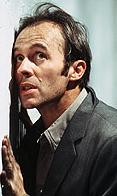SEARCH
REVIEWS
FEATURES
NEWS
Etcetera and
Short Term Listings
LISTINGS
Broadway
Off-Broadway
BOOKS and CDs
OTHER PLACES
Berkshires
London
LA/San Diego
Philadelphia
Elsewhere
QUOTES
On TKTS
LETTERS TO EDITOR
FILM
LINKS
MISCELLANEOUS
Free Updates
Masthead
Writing for us
A CurtainUp  London Review
London Review
 London Review
London ReviewMacbeth
|
I was startled to discover how much of the text was spoken by the single character of Macbeth. Moreover what he didn't speak seemed to emanate from the consciousness of the major protagonist. The inner landscape of Macbeth's tortured soul was clearly the source and center of this fatal dramatic movement. In struggling to bring cohesion to an ensemble of disparate impulses, I began to feel that one way to access the ulterior power and truth of this great work was to embody the entire text in a single actor.
---- Travis Preston, Director |

Stephen Dillane as Macbeth
(Photo: Scott Groller) |
For maybe the first quarter of an hour Dillane talks with his eyes shut. Concentrating hard he stands leaning against the back drop, with knees bent and hands on his thighs while the evocative, deep registers of the bassoon herald the entrance of Macbeth. It is as if Macbeth is dreaming these events. With the line, "So foul and fair a day I have not seen" he starts, and opens his eyes for the first time.
I knew Dillane would be exciting; what I didn't expect was the unselfconscious physicality of his performance. Each character shift calls for a switch of voice or timbre and a delineation of body language. I dreaded the entrance of Lady Macbeth. Would he fall into the Steven Berkoff trap of high camp villainess? I should have had faith. Dillane's woman was subtle, a little gentle voice which suddenly segues into French but this Lady Macbeth's femininity is as toughly manipulative as any woman I have seen in the role. She uses her sex to incite her lord.
Lighting is very important here for changes of mood. In the murder scenes, huge, macabre shadows are cast on the backdrop, a visual allusion to the enormity of the sinful deed. When the scene switches to the "comic" porter, bright lights startle us as Dillane shouts "Knock Knock Knock!" with a vulgar pelvic thrust on each knock. The music is subtle and atmospheric without being intrusive although I might have preferred not to have the visual distraction of the musicians onstage but just to have heard them.
Clever direction keeps this production from being static without it feeling over elaborately staged. There is such variety to Dillane's characters that we are held. In the banquetting scene, Macbeth says by way of explanation to the other diners, "I have a strange infirmity to those that know me" after leaping into the second row of the stalls. The limits of this production are not even bounded by the stage. He then continues to pace in the aisle between the front of the stage and the audience.
As the play progresses and as Macbeth's composure disintegrates, his body becomes blackened by the sand; first his feet disappear as if socked in black, then his hands and finally as he wipes sand in his hair, his face is smeared charcoal. I did wonder how he would play the "Out, damned spot" scene with these totally blackened hands, but he wipes his palms in time for Lady Macbeth to say, "Tous les parfums d'Arabie ne . . . . cette petite main" (I lost the French verb but you will know the quote). For the final battle he puts on his sweat-soaked, blood red shirt and turns his jacket back to front as if wearing armour. Finally as Macbeth's disembodied head is shown, a clever placing of one hand grasping his hair and the line of the jacket concealing his body, convinces that this is the trophy of battle.
In the audience I saw Mark Rylance who this year tackled The Tempest with a cast of three for his final performance at Shakespeare's Globe and I wonder whether he was wishing he had staged that late Shakespeare play with only one actor?
When we think about those actors who Bottom-like want to play all the parts " Let me play Thisby", " Let me play the lion", Stephen Dillane is not one of them. He would not push himself celebrity-like to the front of the line. I remember seeing him one night, on his way down The Cut, head down, walking fast towards the tube, lest anyone recognise him after playing Vanya at the Young Vic. But when we think of the roles he has played, each one reveals his versatility and for each part he takes on, he seems to have reinvented himself and become that character. How astute of Travis Preston to have chosen Dillane to collaborate with. There are performances already scheduled in France at three venues in 2006 but it would be a hand wringing shame if this Macbeth does not resurface in the English speaking world.
Editor's Note: New York readers will want to keep an eye out for our review of a new production from Classic Stage starring Michael Cumpsty (see our Off-Broadway Listings.
|
MACBETH
Written by William Shakespeare Directed by Travis Preston With: Stephen Dillane Scenic Design: Christopher Barreca Composer: Vinny Golia, Harris Eisentadt, Vinny Golia Musicians: Jeremy Drake, Lighting: Benoît Beauchamp Costume Design: Ellen McCartney Sound: Adam Howarth A Center for New Theater at CalArts Production in association with Mark Rubinstein and John Gould Rubin Running time: One hour fifty minutes without an interval Box Office: 020 7359 4404 Booking until 5th November 2005 Reviewed by Lizzie Loveridge based on 28th October 2005 performance at the Almeida Theatre, Almeida Street London N1 (Tube: Angel, Islington) |





